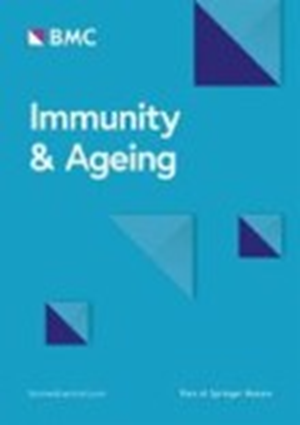重复接种 COVID-19 mRNA 疫苗会导致老年人 IgG4 等级转换,并降低 S1 特异性抗体对 NK 细胞的激活作用
IF 5.6
2区 医学
Q1 GERIATRICS & GERONTOLOGY
引用次数: 0
摘要
先前的研究表明,重复接种 COVID-19 mRNA 疫苗会导致 IgG4 亚类的 SARS-CoV-2 棘突特异性血清抗体明显增加,这表明加强免疫后免疫球蛋白类别的转换影响深远。考虑到重复接种疫苗已被推荐用于老年人,本研究旨在调查老年人群中的 IgG 亚类反应,并评估它们与 Fc 介导的抗体效应器功能的关系。研究对接种第二、第三和第五次疫苗后一个月的老年人(n = 38-50,65-83 岁)血清中穗状 S1 特异性 IgG 亚类浓度(以每毫升任意单位表示)、抗体依赖性 NK 细胞活化、补体沉积和单核细胞吞噬作用进行了量化。与接种第二针和第三针后一个月的年轻人(n = 64,18-47 岁)血清中的亚类分布进行了比较。与年轻人相比,老年人在接种第三针疫苗一个月后的 IgG2 和 IgG4 水平升高(可能与年龄以外的因素有关),在接种第五针疫苗后进一步升高。相对于 S1 特异性总 IgG 浓度,特异性血清抗体介导 NK 细胞活化和补体沉积的能力在重复接种后下降。这种下降与 IgG4/IgG1 比率的增加有关。总之,这些研究结果表明,与年轻人一样,老年人在重复接种 COVID-19 mRNA 疫苗后产生的抗体功能降低。为了更好地了解这些反应的机制及其对疫苗有效性的潜在影响,还需要进行更多的研究。这些知识对于未来为老龄人口设计最佳疫苗接种策略至关重要。本文章由计算机程序翻译,如有差异,请以英文原文为准。
Repeated COVID-19 mRNA vaccination results in IgG4 class switching and decreased NK cell activation by S1-specific antibodies in older adults
Previous research has shown that repeated COVID-19 mRNA vaccination leads to a marked increase of SARS-CoV-2 spike-specific serum antibodies of the IgG4 subclass, indicating far-reaching immunoglobulin class switching after booster immunization. Considering that repeated vaccination has been recommended especially for older adults, the aim of this study was to investigate IgG subclass responses in the ageing population and assess their relation with Fc-mediated antibody effector functionality. Spike S1-specific IgG subclass concentrations (expressed in arbitrary units per mL), antibody-dependent NK cell activation, complement deposition and monocyte phagocytosis were quantified in serum from older adults (n = 38–50, 65–83 years) at one month post-second, -third and -fifth vaccination. Subclass distribution in serum was compared to that in younger adults (n = 64, 18–47 years) at one month post-second and -third vaccination. Compared to younger individuals, older adults showed increased levels of IgG2 and IgG4 at one month post-third vaccination (possibly related to factors other than age) and a further increase following a fifth dose. The capacity of specific serum antibodies to mediate NK cell activation and complement deposition relative to S1-specific total IgG concentrations decreased upon repeated vaccination. This decrease associated with an increased IgG4/IgG1 ratio. In conclusion, these findings show that, like younger individuals, older adults produce antibodies with reduced functional capacity upon repeated COVID-19 mRNA vaccination. Additional research is needed to better understand the mechanisms underlying these responses and their potential implications for vaccine effectiveness. Such knowledge is vital for the future design of optimal vaccination strategies in the ageing population.
求助全文
通过发布文献求助,成功后即可免费获取论文全文。
去求助
来源期刊

Immunity & Ageing
GERIATRICS & GERONTOLOGY-IMMUNOLOGY
CiteScore
10.20
自引率
3.80%
发文量
55
期刊介绍:
Immunity & Ageing is a specialist open access journal that was first published in 2004. The journal focuses on the impact of ageing on immune systems, the influence of aged immune systems on organismal well-being and longevity, age-associated diseases with immune etiology, and potential immune interventions to increase health span. All articles published in Immunity & Ageing are indexed in the following databases: Biological Abstracts, BIOSIS, CAS, Citebase, DOAJ, Embase, Google Scholar, Journal Citation Reports/Science Edition, OAIster, PubMed, PubMed Central, Science Citation Index Expanded, SCImago, Scopus, SOCOLAR, and Zetoc.
 求助内容:
求助内容: 应助结果提醒方式:
应助结果提醒方式:


